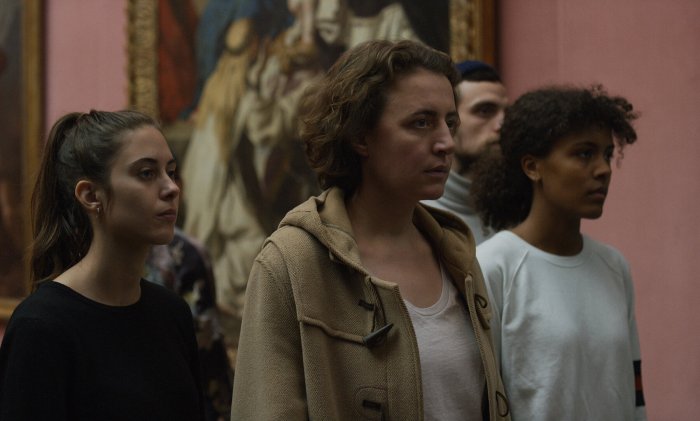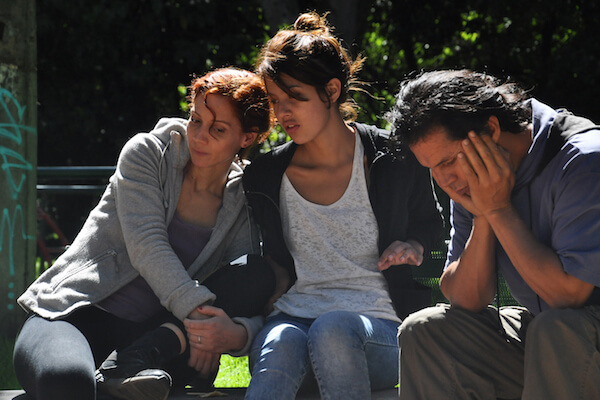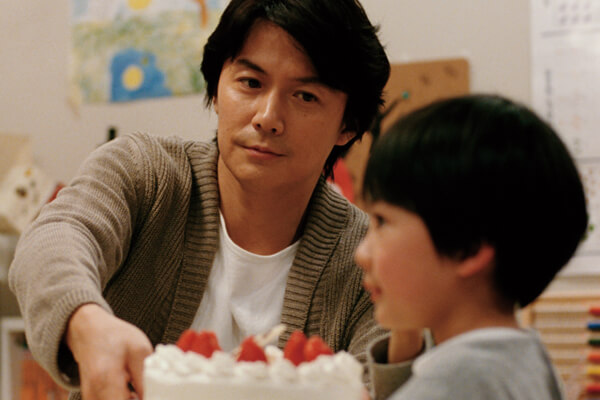Haruka Ayase, Suzu Hirose, Kaho, and Masami Nagasawa in Hirokazu Kore-eda’s “Our Little Sister.” | SONY PICTURES CLASSICS
There are Americans who live in a world made entirely of Japanese culture: anime, manga, outrageous fashion. The frequency with which Japanese settings are used in cyberpunk science fiction suggests that many writers see the country as our future.
Director Hirokazu Kore-eda is busy doing something else, exploring the style, if not the ethos, of the Japanese past. While filmmakers like Sion Sono and Takashi Miike make ultra-violent, cartoonish work, Kore-eda’s films harken back to the classic tradition of YasujirÅ Ozu and Mikio Naruse. “Our Little Sister” pays overt homage to the narrative of Kon Ichikawa’s “The Makioka Sisters” and the style of Ozu’s late films. Unfortunately, there’s also something complacent and overly cozy about it.
“Our Little Sister” is based on Yoshida Akimi’s graphic novel “Umimachi Diary.” Three sisters in their 20s — Sachi (Haruka Ayase), Yoshino (Masami Nagasawa) and Chika (Kaho) — live together, estranged from their father. The film begins with their discovery of the existence of their half-sister Suzu (Suzu Hirose), a 15-year-old girl in a school uniform. They meet her as a consequence of their father’s funeral, which leads them from their home in the seaside town of Kamakura to the countryside. On impulse, they invite Suzu to live with them. While Sachi, Yoshino, and Chika often quarrel among themselves, Suzu gets along great with each of them. They don’t even mind when she almost passes out after dipping into homemade plum wine. The film follows the family over the course of a year.
Evoking a Japanese past, Hirokazu Kore-eda conjures a world of women
Despite his ties to the past, Kore-eda isn’t exactly politically or even socially conservative. One of his earliest films was a documentary about one of the few men in Japan to come forward and be honest about his HIV diagnosis. One difference between his films and Ozu’s is that his reflect a world where the nuclear family has splintered. Ozu’s most famous film, “Tokyo Story,” criticized youth for not taking care of their elderly parents, and many of his other films depicted tension between middle-aged parents and their sons and daughters, often around marriage.
The world of Kore-eda’s films contains a lot more options, many of them negative. In one of his films, a mother simply abandons her children. “Our Little Sister” shows a group of 20-something women raising their teenage half-sister and taking over the maternal role without much fuss. They’re sisters, but they act like mothers.
Nevertheless, something about “Our Little Sister” starts to grate. The references to traditional Japanese rituals, such as looking at cherry blossoms and harvesting plums for winemaking, become a bit much. While the cinematography is pretty, it shows off Mikiya Takimoto’s background in advertising whenever it stretches for genuine beauty. A scene in which Suzu and a boy ride through a tunnel of blooming cherry trees gets cloying. The film’s attention to the passing of the seasons recalls Naomi Kawase’s recent “Sweet Bean,” another largely failed attempt to evoke classic Japanese cinema.
“Our Little Sister” passes the Bechdel test — to have at least two women discussing something other than a man — in its first five minutes. One way it differs from classic Japanese cinema is that it presents a near-matriarchal world. The sisters interact with men at work and they have boyfriends sometimes, but the relationships that truly matter are with women. While Ozu was gay, he was obsessed with the ins and outs of marriage. But to depict a changed Japan, Kore-eda borrows Ozu’s use of low camera angles showing people eating at a table and his blocking and framing of actors. “Our Little Sister” has one foot in 20th-century Japan, another in a new world that seems to be forming. It’s often engaging, but just as often awkward and misshapen.
OUR LITTLE SISTER | Directed by Hirokazu Kore-eda | Sony Pictures Classics | In Japanese with English subtitles | Opens Jul. 8 | Angelika Film Center, 18 W. Houston St. at Mercer St. | angelikafilmcenter.com/nyc | Lincoln Plaza Cinema, 1886 Broadway at 63rd St. | lincolnplazacinema.com



































